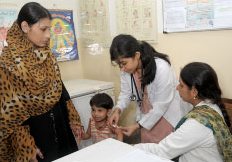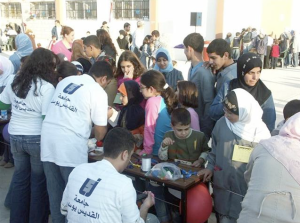
Students at the Urban Health Program at the Aga Khan University in Pakistan provide health and socio-economic support to Karachi residents.
Guest post from Innovations in Civic Participation Intern, Alice Wu.
On June 6, eight innovative higher education programs were recognized by the MacJannet Foundation and Talloires Network for their positive university and community impact. Leaders of universities and student representatives gathered in Talloires, France, to award these extraordinary programs the MacJannet Prize for Global Citizenship. The winners were previously announced on April 16 after careful review by a selection committee of leaders in higher education civic engagement. Video of the prize winners can be seen here. And the eight programs are listed here.
The first prize went to the Urban Health Program from Aga Khan University in Pakistan, which is recognized by the World Health Organization’s (WHO) grant for Universities in Solidarity for the Health of Disadvantaged Communities (UNI-SOL). This long-standing program provides health and socio-economic support to the residents of the squatter communities in Karachi, Pakistan.
Dr. Muhammed Yousuf of Aga Khan University commented that the “main objective is to provide teaching and learning that is important to medical students to learn about the community dynamics and social issues in Karachi.”

University students at Theewaterskloof International Community Development Project in South Africa design service projects addressing community needs.
Theewaterskloof International Community Development Project was one of the two second prize winners. The project is a cross cultural collaboration between Cape Peninsula University of Technology in South Africa and HAN University in the Netherlands.
Students from the respective universities work together to design service projects in their own area of studies after identifying certain community needs.
Student representative Fattinald Phaka Rangango described the program as one that “creates an environment where we can interact and share experiences – cultural experiences” and it had “brought in a new perspective of how institutions approach community engagement.”

The Operation 7th Day program at Université Saint-Joseph in Lebanon began providing emergency relief following the Israel-Lebanon war in 2006, before expanding into a national scale effort.
The other second prize winner went to Operation 7th Day from Université Saint-Joseph in Lebanon (USJ). The operation began after the Israel-Lebanon war in 2006 and provided emergency relief for surrounding communities in South Lebanon. Social Animator in USJ’s Social Service directorate Gloria Abdo explained that Operation 7th Day continues “to offer health care for the displaced and education activities and civil engineering activities.” This program in collaboration with NGOs, student and faculty has expanded the initiatives beyond South Lebanon onto national scale efforts.
Rangango from the Theewaterskloof International Community Development Project asks “Do you drop those people that you brought so much hope to and continue and get your degree and leave? Or do you actually go back and say you’re still here for them, for the purpose of sustainability?” Undoubtedly, these programs have affected students and faculty in the long-term. Dr. Yousuf said that their Urban Health Program has “laid a road to help students and expose them to community issues and problems”, and many students have been inspired to choose public health as their future careers. Student Joëlle Hobeika of Operation 7th Day commented that the program helps them in long-term studies.
Shamsh Kassim-Lakha, founding President of Aga Khan University and a member of the Talloires Network Steering Committee discussed the value of the Talloires Network and the MacJannet Prize: “It has enabled its members to learn from each other about the value, importance and methodology of engaging with the communities in which they function. Such direct engagement in the community is an important means of universities discharging their obligations to societies that have nurtured and sustained them.”
For more information, please visit the Talloires Network and MacJannet Foundation. Keep an eye out for the Talloires 24 Student Discussion Series on July 20!
Pingback: MacJannet Prize for Global Citizenship Honors Innovative University Service Programs « The Ismaili News